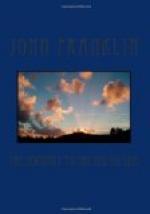The Indians having informed us that we were now within twelve miles of the rapid where the Esquimaux have invariably been found, we pitched our tents on the beach under the shelter of a high hill whose precipitous side is washed by the river, intending to send forward some persons to determine the situation of their present abode. Some vestiges of an old Esquimaux encampment were observed near the tents and the stumps of the trees bore marks of the stone hatchets they use. A strict watch was appointed consisting of an officer, four Canadians, and an Indian, and directions were given for the rest of the party to sleep with their arms by their side. That as little delay as possible might be experienced in opening a communication with the Esquimaux we immediately commenced arrangements for sending forward persons to discover whether there were any in our vicinity. Akaitcho and the guides proposed that two of the hunters should be despatched on this service who had extremely quick sight and were accustomed to act as scouts, an office which requires equal caution and circumspection. A strong objection however lay against this plan in the probability of their being discovered by a straggling hunter, which would be destructive to every hope of accommodation. It was therefore determined to send Augustus and Junius, who were very desirous to undertake the service. These adventurous men proposed to go armed only with pistols concealed in their dress, and furnished with beads, looking-glasses, and other articles, that they might conciliate their countrymen by presents. We could not divest our minds of the apprehension that it might be a service of much hazard if the Esquimaux were as hostile to strangers as the Copper Indians have invariably represented them to be, and we felt great reluctance in exposing our two little interpreters, who had rendered themselves dear to the whole party, to the most distant chance of receiving injury, but




